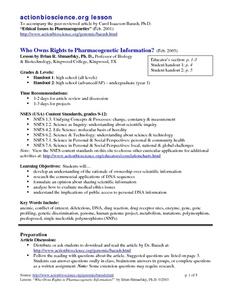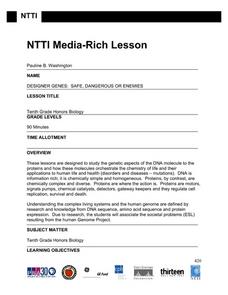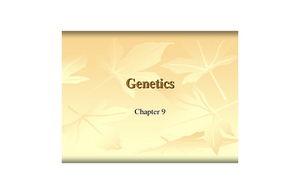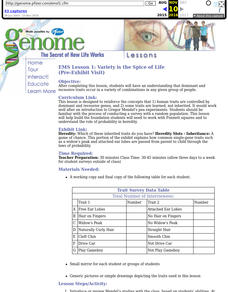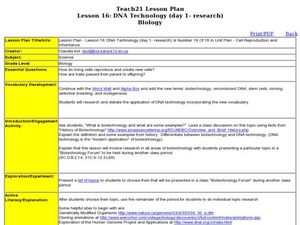Perkins School for the Blind
Chromosome Models- Karyotyping
Create your own karyotypes with clay in a kinesthetic genome activity. This tactile experience was created for visually impaired pupils, but can be used for all hands-on learners who are beginning to study chromosomes. The preparation...
Curated OER
Edible DNA
Students use multicolored soft candies (gumdrops and candy orange slices) and toothpicks to create models of DNA structures. They discuss the fact that DNA must copy itself before splitting into two cells. Students demonstrate this by...
Curated OER
Cracking the Genetic Code
High schoolers explain what the knowledge of DNA can tell us about ourselves and other organisms and species. They also explore the systematic study of the human genome.
Curated OER
Bioethics and the HGP
Students analyze case studies using the rules and principles of ethics. They comprehend which rules and principles of theics are of great importance to the Human Genome Project. Students participate in mock student hearings.
Curated OER
What Can We Learn From the X Chromosome?
Students read about the X and Y chromosomes in humans and complete a worksheet.
Curated OER
Why do we need Vitamin C in our diet? Or Why do we carry old inactive genes in our genome?
Pupils explore and explain how mutations in the DNA sequence of a gene may be silent or result in phenotypic change in an organism and in its offspring. They analyze how evolution and biodiversity are the result of genetic changes that...
Curated OER
Genetic Research and Liberties
Learners examine civil liberties issues in relation to genetic research, and discuss how genetic medical information may be used. They present personal viewpoints about genetic research as it relates to civil liberties
Curated OER
Why Do We Need Vitamin C in Our Diet?
Students compare/contrast the DNA sequence data of the rat GULO gene to the inactive human GULO gene. They translate and align the sequences, and propose a scenario to explain the occurrence of an inactive DNA sequence to that of an...
Curated OER
Who Owns Rights to Pharmacogenetic Information?
Students develop an understanding of the rationale of ownership over scientific information. They research commercial applications of DNA sequences. They analyze how to evaluate medical ethics issues.
Curated OER
The Structure of DNA
Students describe the structure of the double helix, explain how DNA copies itself, and recognize that the sequence of DNA is what makes each individual unique.
Curated OER
Jurassic Park: The Science and Ethics of Genetic Engineering
Explore genetic engineering through an engaging "Jurassic Park" unit, which is an extensive use of a cross-curricular teaching event. Planned for AP Biology, English, and Calculus students, learners and teachers are involved for 4-6...
Teach Engineering
Tell Me Doc—Will I Get Cancer?
Can you beat the odds of cancer? In the first installment of a seven-part series, future biomedical engineers consider how to detect and diagnose cancer. An article on biosensors provides useful information toward this goal.
Virginia Department of Education
Biotechnological Issues and Bioethics
Culminate a bioethics unit with the implementation of a lesson plan that incorporates the Socratic method to encourage class feedback and participation. Pupils participate in a discussion on bioethics and morality, complete a writing...
Curated OER
Temperature and the Tomato
You will need a photovoltaic system and monitor at your school in order to obtain all of the data required to thoroughly implement this instructional activity. Your class monitors daily temperature and insolation amounts over a two week...
Curated OER
Genetics
Students create a checklist of traits common in all of their families. Uisng a table, they compare and contrast their family members to non-family members. They also review dominant and recessive traits and discuss how knowing about...
Curated OER
EMS Lesson 1: Variety is the Spice of Life
Students discern that dominant and recessive traits occur in a variety of combinations in any given group of people.
Curated OER
Variety is the Spice of Life
Students explore Gregor Mendel's work with genetics. They complete a survey of their friends and family in order to identify dominant and recessive traits. Once their surveys are complete, students discuss the ways in which dominant...
Curated OER
Who am I and Why?
Students make comparisons about themselves and others, which are real and meaningful. They study some basic concepts in the area of genetics and do a complimentary series of experiments, or explorations that illustrate these concepts
Curated OER
Where are the Dinosaurs?
Students construct their own diorama based on the life of a dinosaur. In this dinosaur lesson, students create models of dinosaurs and dinosaurs' eggs to explore the life cycle of this extinct species.
Curated OER
Lesson 16: DNA Technology
Students research different areas of biotechnology. In this biology lesson, students create a presentation about their research. They debate the topic presented and share their views on the subject.
Curated OER
Ghost in Your Genes
Students explore DNA microarrays. In this genetics lesson, students model DNA microarrays that are used by scientists. Students work to determine levels of breast cancer genes in patients. They will determine the treatment required based...
Curated OER
Mendelian and Non-Mendelian Heredity
Tenth graders discuss their physical features, and why they look the way they do. They listen as the teacher discusses DNA, alleles, and dominant or recessive genes. Students perform an experiment with different colored markers...
Curated OER
Genetic Ethics Debate
Students select topics relating to bioethical questions which they research and debate. They, in groups, select topics and are given two to three weeks to research their topics, taking advantage of their school libraries and local public...
National Nanotechnology Infrastructure Network
Help or Hype: The Ethics of Bio-Nanotechnology
Ethical concerns are not always black and white. A well-designed activity presents learners with scenarios for which ethics may come into question. Scholars learn to consider the different sides of a situation and make an unbiased...
Other popular searches
- Human Genome Project
- The Human Genome Project
- Human Genome Project. Dna
- Human Genome Lesson Plan
- Biology the Human Genome
- Biology Human Genome
- Length Cm Human Genome
- Human Genome Prophecy
- Human Genome Projecy
- Human Genome Webquest
- Human Genome Project Dna
- Human Genome Web Quest










